Hi, I am Wyzard, your visionary guide in a world where the buying experience is transforming. The way we ...
Initial Software Stack for Startups and Scaleups: Tools for Every Department
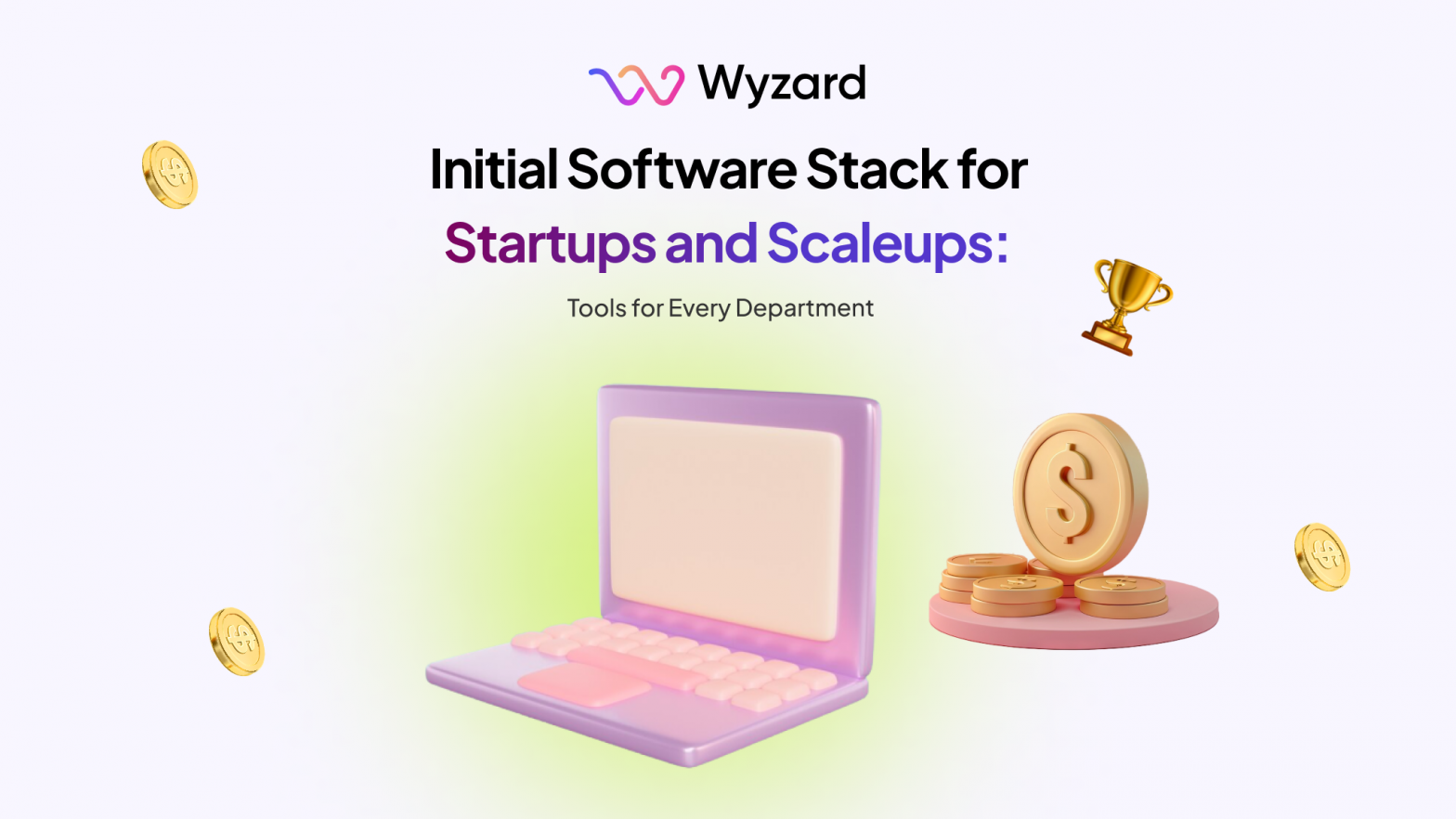

Subscribe Now
Starting a business is exhilarating, but it comes with its fair share of challenges. One of the biggest hurdles? Budget constraints.
As a startup founder, you’re constantly walking a tightrope between frugality and functionality. You need to pinch pennies, but you can’t afford to skip on productivity and efficiency. That’s where the right software stack comes in.
Investing in essential tools isn’t just about convenience; it’s about business continuity. Without some of the software we’ll discuss, you might find yourself struggling to keep up with competitors or, worse, facing operational roadblocks.
The key is to start with a lean but effective stack that covers your bases and allows room for growth.
In this blog, we’ll explore the must-have software that can help your startup hit the ground running.
We’ll focus on tools that offer maximum bang for your buck, keeping in mind that as you scale, you can always upgrade to more sophisticated solutions.
Why is it important for startups to have the right software stack?
When you’re starting out, there are a lot of concerns right from how you’re going to hire and manage your employees to how you plan to sort your marketing. Here’s why you must focus on building the right software stack in your initial stages:
1. Efficiency and productivity boost
The right software stack automates repetitive tasks, streamlines workflows, and allows your team to focus on high-value activities.
Instead of getting bogged down in manual processes, your team can channel their energy into innovation and growth.
This efficiency boost is crucial when you’re operating with limited resources and trying to make every minute count.
2. Scalability and flexibility
As your startup grows, your needs will evolve. A well-chosen software stack provides the flexibility to scale up or down as needed.
Cloud-based solutions, for example, can easily accommodate increased data storage or user numbers without requiring significant infrastructure changes.
This scalability ensures that your tools grow with you rather than becoming bottlenecks.
3. Cost-effectiveness
While it might seem counterintuitive, investing in the right software can actually save you money in the long run.
By automating tasks and improving efficiency, you reduce the need for additional manpower. Many modern software solutions also offer pay-as-you-go models, allowing you to only pay for what you use. This can be particularly beneficial for startups with fluctuating needs.
What should your initial software stack consist of?
The ideal software stack for startups isn’t one-size-fits-all. A DevOps monitoring tool might be crucial for a tech startup but unnecessary for an e-commerce business.
However, regardless of your industry, there are some fundamental tools that every startup should consider. These form the backbone of your operations and set the stage for future growth.
In this blog, we’ll focus on these essential tools – the must-haves that can make or break your startup’s efficiency and productivity.
Here’s a quick rundown of what we’ll cover:
- Management and communication tools
- Sales and marketing software
- Finance and accounting essentials
- Website and eCommerce platforms
- IT and development tools
- Human resource management software
- Customer support systems
- Productivity and collaboration solutions
These categories represent the core functions that most startups need to address from day one.
By ensuring you have capable tools in each of these areas, you’ll be well-positioned to tackle the challenges of startup life.
Note: Each software solution mentioned in this blog offers a range of pricing options, from low-cost or free tiers for beginners to more advanced plans for scaling businesses. You can start with the most affordable tier to test the waters, then upgrade to a plan that aligns with your growing needs and budget as your business expands.
Best software for management and communication
Management and communication tools are the backbone of any startup’s operations. They facilitate smooth workflow, ensure everyone’s on the same page, and keep projects moving forward efficiently.
1. Project management tools for startups
Project management tools help teams organize tasks, track progress, and collaborate effectively. They’re essential for keeping projects on schedule and within budget.
Trello

Trello is a visual collaboration tool that creates a shared perspective on any project. Its intuitive board-and-card system makes it easy to organize tasks and workflows. Trello’s strength lies in its simplicity and flexibility, making it ideal for small teams or individual projects. It’s great for startups that need a quick, easy-to-implement solution without a steep learning curve.
Asana

Asana takes project management to the next level with more robust features. It offers multiple views (list, board, timeline, calendar) and is excellent for complex projects with interdependent tasks. Asana shines in its ability to handle large, multi-faceted projects and cross-functional team collaboration. For startups with more complex workflows or those anticipating rapid growth, Asana provides the scalability and feature set to support evolving needs.
2. Communication tools for startups
Effective communication is crucial for startup success. These tools facilitate real-time messaging, video conferencing, and seamless information sharing.
Slack

Slack has revolutionized workplace communication with its channel-based messaging platform. It integrates with numerous other tools, making it a central hub for team collaboration. Slack’s real-time messaging, file sharing, and searchable history make it invaluable for quick decision-making and maintaining team cohesion, especially in remote or hybrid work environments.
Zoom

When it comes to video conferencing, Zoom has become the go-to solution for many startups. Its reliability, ease of use, and features like screen sharing, virtual backgrounds, and breakout rooms make it ideal for both internal meetings and client calls. Zoom’s ability to handle large groups makes it scalable as your startup grows.
Microsoft Teams

For startups already in the Microsoft ecosystem, Teams offers a comprehensive communication solution. It combines chat, video conferencing, file storage, and application integration. Teams’ tight integration with other Microsoft tools like Office 365 can streamline workflows for startups heavily reliant on Microsoft products.
3. Email platforms for startups
Despite the rise of instant messaging, email remains a critical communication tool, especially for external correspondence.
Gmail

Part of Google Workspace, Gmail offers more than just email. And for startups — they can get started with it for free! Its integration with other Google tools, powerful search capabilities, and features like smart compose and easy organization make it a popular choice. For startups, Gmail’s familiar interface and robust spam filtering can boost productivity and security.
Best software for sales and marketing department
Effective sales and marketing are crucial for startup growth. These tools help manage customer relationships, automate marketing efforts, and analyze performance.
1. Customer relationship management (CRM) for startups
CRM software helps manage customer interactions, track sales processes, and analyze customer data to improve relationships and drive sales.
HubSpot CRM

HubSpot’s free CRM is an excellent starting point for many startups. It offers contact management, deal tracking, and basic marketing tools. As your startup grows, you can easily upgrade to more advanced features in HubSpot’s paid tiers. Its user-friendly interface and comprehensive feature set make it a popular choice for startups looking to scale their sales efforts.
Zoho CRM

Zoho CRM offers a balance between functionality and affordability. It provides robust features like lead and contact management, sales forecasting, and workflow automation. For startups looking for a middle ground between HubSpot’s simplicity and Salesforce’s complexity, Zoho CRM can be an excellent fit.
Odoo CRM
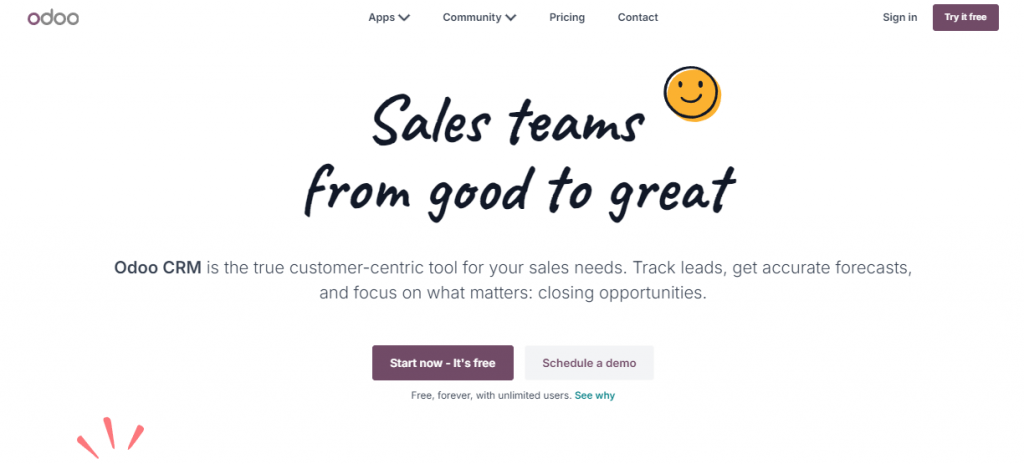
Odoo CRM, an open-source powerhouse with over 5 million users, offers a free starting point and budget-friendly scaling options. This versatile platform empowers sales teams to track top leads, personalize sales cycles, and leverage marketing automation to boost overall performance. With Odoo, users can analyze lead quality, make faster decisions, and streamline operations by integrating emails directly into the system. The software’s comprehensive features, including customizable statistics and forecasts, make it an ideal choice for businesses looking to enhance their sales processes while maintaining flexibility in pricing as they grow.
2. Email marketing software for startups
Email marketing remains one of the most effective ways to reach and engage customers. These tools help create, send, and analyze email campaigns.
Mailchimp
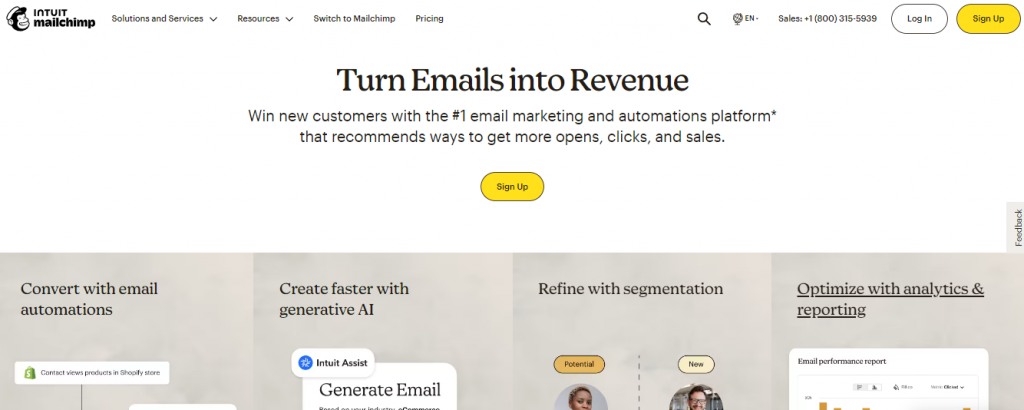
Known for its user-friendly interface, Mailchimp is great for creating and sending newsletters, automated emails, and basic marketing campaigns. Its drag-and-drop email builder and pre-designed templates make it easy for non-technical users to create professional-looking emails. Mailchimp also offers basic CRM functionality, making it a good all-in-one solution for early-stage startups.
Constant Contact

Another solid option, Constant Contact offers easy-to-use templates and robust analytics. It’s particularly strong in event marketing features, which can be valuable for startups organizing webinars or in-person events. Constant Contact’s reliable deliverability rates and excellent customer support make it a trustworthy choice for email marketing beginners.
3. Social media management tools for startups
Managing multiple social media accounts can be time-consuming. These tools help schedule posts, track engagement, and analyze performance across platforms.
Zoho Social

Zoho’s comprehensive social media analytics tool allows brands to optimize their online presence. This all-in-one platform offers in-depth activity, ad, engagement, and competitive analysis. Users can collaborate seamlessly, use 75+ pre-built reports, and AI-powered assistance for quick insights. The tool features data blending capabilities, automated report scheduling, and embedded analytics options. Whether you’re starting out or scaling up, Zoho’s flexible solution adapts to your needs, helping you consolidate metrics, perform end-to-end analysis, and drive brand growth through data-driven decision-making.
Buffer

Buffer offers a simpler interface compared to Hootsuite, making it great for small teams looking to maintain a consistent social media presence. Its analytics tools help you understand what content resonates with your audience, allowing you to refine your social media strategy over time.
4. SEO and analytics tools for startups
Understanding your website’s performance and improving its visibility in search engines is crucial for online success.
Google Analytics

The gold standard for website analytics, Google Analytics gives you insights into your site traffic, user behavior, and conversion rates. It’s an essential tool for understanding your audience and measuring the effectiveness of your marketing efforts. Best of all, it’s free, making it a no-brainer for cash-strapped startups.
SEMrush

SEMrush is a comprehensive SEO toolkit offering keyword research, competitor analysis, and site audit features. It’s particularly useful for startups looking to improve their search engine rankings and analyze their competitors’ strategies. While it comes with a price tag, its insights can be invaluable for startups heavily reliant on organic search traffic.
Yoast SEO

Yoast SEO, a powerful WordPress plugin, optimizes your website for search engines with ease. It guides content creation by allowing you to set crucial SEO parameters like titles, focus keywords, and meta descriptions. Advanced features include canonical URL management, redirects, and robot settings. The plugin’s pre-publication analysis ensures your content meets SEO requirements. Best of all, you can start enhancing your site’s visibility for free with Yoast’s basic version, making it an ideal choice for beginners and seasoned marketers alike.
Essentials for finance and accounting department
Proper financial management is critical for startup survival. These tools help manage finances, track expenses, and ensure compliance.
1. Accounting software for startups
Accounting software helps manage financial transactions, generate reports, and maintain compliance with tax regulations.
QuickBooks

A popular choice for small businesses and startups, QuickBooks offers features like invoicing, expense tracking, and financial reporting. Its cloud-based version allows for easy access from anywhere, making it ideal for remote teams. QuickBooks’ extensive integration capabilities with other business tools make it a versatile choice for growing startups.
Xero

Known for its user-friendly interface, Xero is a cloud-based accounting solution gaining popularity among startups. It offers real-time cash flow visibility and easy collaboration with your financial advisor. Xero’s strong emphasis on automation can save precious time for startup founders juggling multiple responsibilities.
FreshBooks
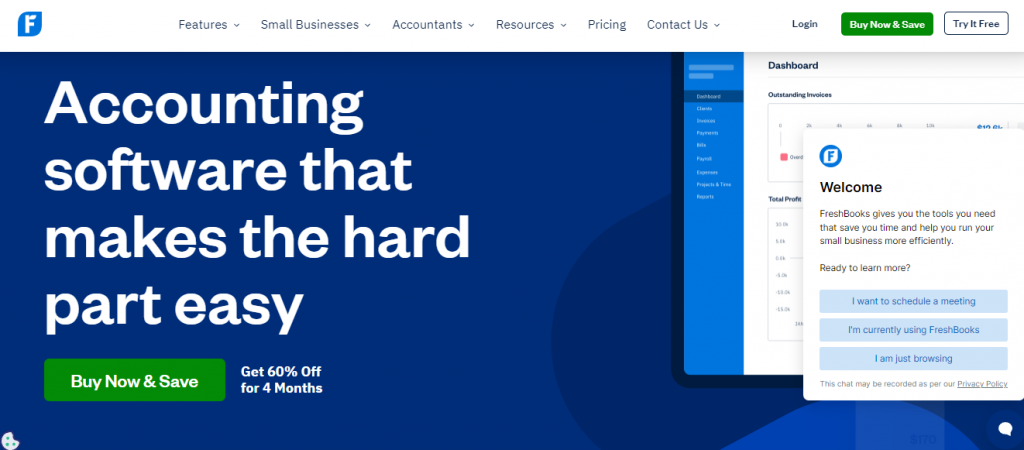
Geared towards service-based businesses, FreshBooks excels in time tracking and invoicing. Its simple interface and focus on the needs of small businesses make it a good fit for freelancers or very early-stage startups. FreshBooks’ robust mobile app is particularly useful for entrepreneurs on the go.
Tally

Tally is a comprehensive business management software that streamlines accounting, inventory, and compliance tasks for businesses of all sizes. With its user-friendly interface and robust features, Tally simplifies financial processes, from bookkeeping to GST filing. The software offers both on-premise and cloud solutions, allowing businesses to choose the option that best fits their needs. Tally’s pricing model includes a free trial, enabling users to explore its capabilities before committing to a paid plan.
Zoho Finance

Zoho Finance is an all-in-one financial management suite that covers accounting, invoicing, expense tracking, and more. This cloud-based platform offers seamless integration across various financial functions, providing businesses with a unified view of their finances. Zoho Finance caters to businesses of all scales, from startups to enterprises, with its scalable pricing structure. Users can begin with a free plan for basic needs and upgrade to more advanced tiers as their business grows, ensuring cost-effective financial management at every stage.
2. Payment processing software for startups
These tools enable startups to accept payments easily and securely, crucial for e-commerce businesses or any startup offering paid services.
Stripe

Built with developers in mind, Stripe offers robust APIs for online payments. It’s a favorite among tech startups for its flexibility and extensive documentation. Stripe’s ability to handle recurring payments and its support for multiple currencies make it suitable for startups with global ambitions.
PayPal

A household name in online payments, PayPal is easy to set up and widely recognized by customers. Its buyer protection features can help build trust with customers, crucial for new startups. While its fees can be higher than some alternatives, PayPal’s ubiquity and ease of use make it a solid choice for many startups.
Best software for website & eCommerce
In today’s digital age, a strong online presence is crucial for startups. These tools help create and manage websites and online stores efficiently.
1. Website builders for startups
Website builders allow you to create and maintain a professional-looking website without extensive coding knowledge.
WordPress

Powering over 40% of all websites, WordPress offers unparalleled flexibility and a vast ecosystem of plugins and themes. It’s highly customizable and can be used for everything from simple blogs to complex e-commerce sites. For startups that anticipate needing a wide range of functionalities as they grow, WordPress’s extensibility makes it an excellent choice.
Wix

For those who want a more visual, drag-and-drop approach, Wix offers an intuitive website builder with built-in hosting. Its AI-powered Wix ADI can even create a basic website for you based on your inputs. Wix is ideal for startups that need to get a professional-looking site up quickly without diving into code.
2. E-Commerce platforms for startups
These platforms provide the necessary tools to set up and manage an online store.
Shopify

A complete e-commerce solution, Shopify handles everything from inventory management to payment processing. It’s user-friendly and scalable, making it suitable for startups at various stages of growth. Shopify’s extensive app store allows for easy addition of features as your business expands.
WooCommerce

A plugin for WordPress, WooCommerce turns your WordPress site into a fully-functional online store. It’s highly customizable and integrates seamlessly with other WordPress plugins. For startups already using WordPress, WooCommerce offers a natural transition into e-commerce.
Must-have for your IT department
For tech-focused startups or those with in-house development teams, these tools are essential for efficient software development and deployment.
1. Version Control
Version control systems are crucial for managing code changes and collaborating on software projects.
GitHub

The go-to platform for developers to store, manage, and track changes in their code. GitHub’s collaborative features like pull requests and code reviews make it invaluable for team projects. Its extensive community and integration capabilities make it a hub for open-source collaboration.
GitLab

Similar to GitHub but with some added features like built-in CI/CD pipelines. GitLab offers a complete DevOps platform, which can be particularly useful for startups looking to streamline their development processes.
2. Cloud Services
Cloud services provide scalable infrastructure and platform services, allowing startups to focus on development rather than managing hardware. Now which cloud service will be most cost-effective for you will depend on what you’re trying to build, the instance type, and the storage tier — it’s something that Wyzard’s Procurement Team can help you figure out and select the best.
Here are the three most popular cloud service providers:
AWS (Amazon Web Services)
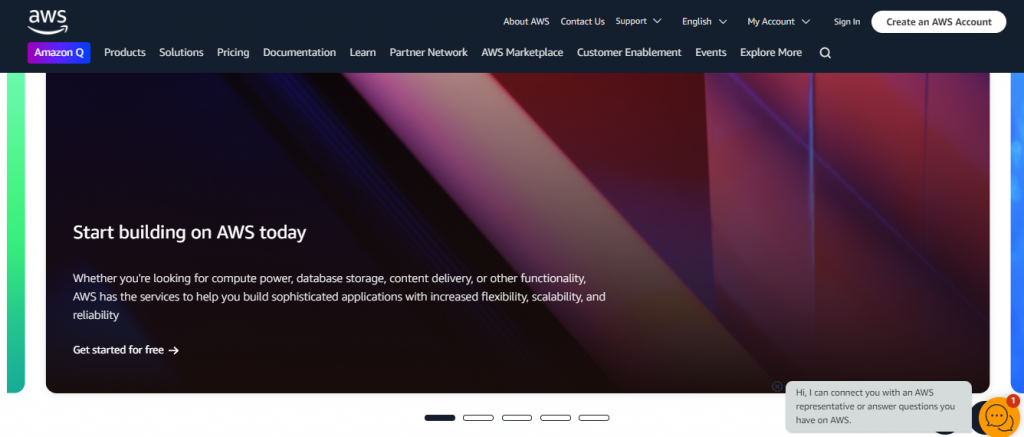
The largest cloud computing platform, AWS offers a vast array of services from basic storage to advanced machine learning tools. Its pay-as-you-go model makes it cost-effective for startups, allowing them to scale resources as needed.
Google Cloud

Google’s answer to AWS, it integrates well with other Google services and is known for its strong data analytics offerings. For startups already using Google Workspace, Google Cloud can provide a seamless extension of their IT infrastructure.
Microsoft Azure

If you’re already in the Microsoft ecosystem, Azure offers seamless integration with other Microsoft tools. It’s particularly strong in hybrid cloud environments, which can be useful for startups with specific on-premises requirements.
3. Collaboration Tools
These tools facilitate coordination and knowledge sharing within development teams.
Jira
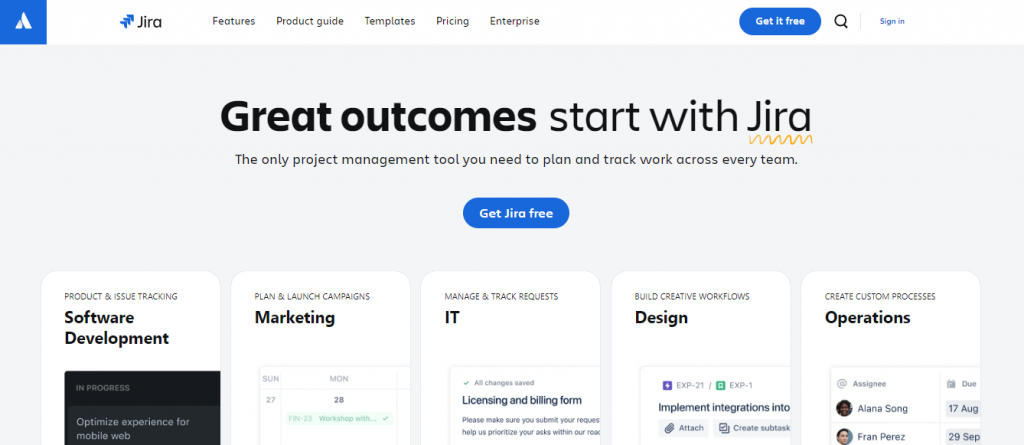
Primarily used for bug tracking and project management in software development, Jira is highly customizable for different workflows. It integrates well with other Atlassian products like Confluence, providing a comprehensive solution for development teams.
Best human resource management software
As startups grow and begin to hire employees, HR software becomes crucial for managing personnel effectively.
GreytHR

GreytHR is a comprehensive cloud-based HR and payroll management software designed to streamline human resource operations for businesses of all sizes. This user-friendly platform automates key HR processes including attendance tracking, leave management, payroll processing, and statutory compliance. GreytHR offers a range of features from employee self-service portals to performance management tools, enhancing overall workforce productivity. With its flexible pricing model, businesses can start with a basic free plan and scale up to more advanced tiers as they grow, making it an ideal solution for startups and established companies alike.
Gusto

Known for its payroll services, Gusto also offers benefits administration and basic HR tools. Its simplicity and focus on small businesses make it a good fit for startups just beginning to build out their HR functions.
Best customer support ticket system
Providing excellent customer support is crucial for startup success. These tools help manage and track customer inquiries efficiently.
Zendesk

A comprehensive customer service platform that includes ticketing, live chat, and a knowledge base. Zendesk’s scalability and extensive integration capabilities make it suitable for startups anticipating rapid growth in customer support needs.
Freshdesk
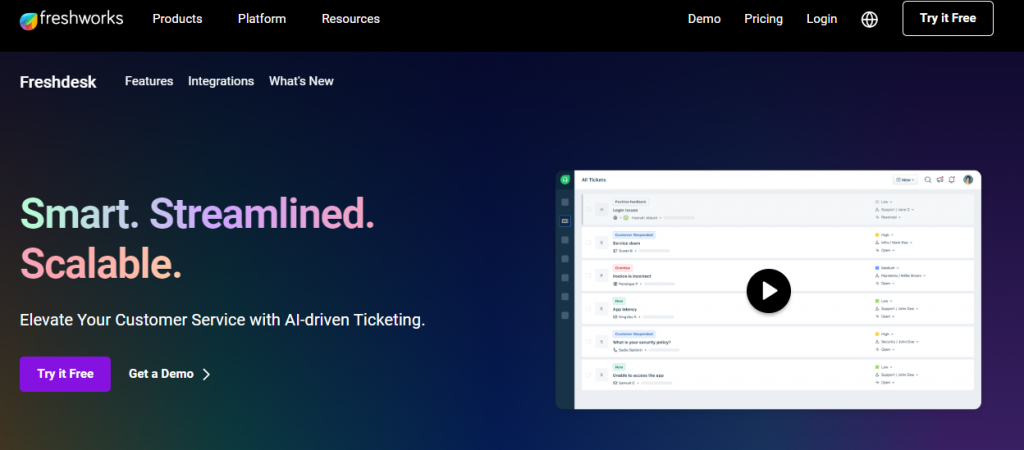
Similar to Zendesk but often more budget-friendly for startups. Freshdesk offers a robust set of features, including multi-channel support, automation, and reporting. Its user-friendly interface makes it easy for small teams to get started quickly.
Software for productivity & collaboration at startups
These tools facilitate document creation, file sharing, and general productivity across all departments.
Google Workspace

Formerly G Suite, this includes Google Docs, Sheets, and Slides for collaborative document creation and editing. Its real-time collaboration features and familiarity make it a popular choice for startups embracing remote or hybrid work models.
Microsoft 365
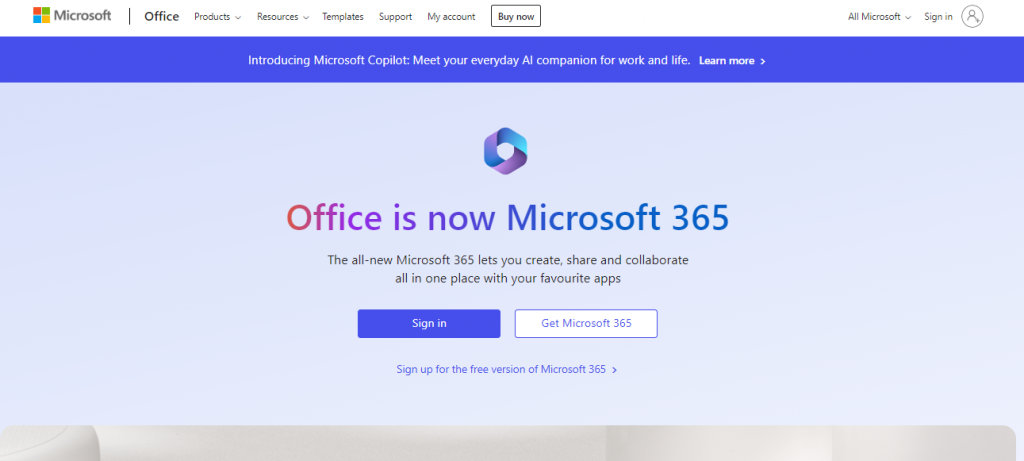
The cloud-based version of Microsoft Office, offering familiar tools like Word, Excel, and PowerPoint with added collaboration features. For startups already comfortable with Microsoft products, 365 provides a seamless transition to cloud-based work.
Google Drive

Integrated with Google Workspace, Drive offers generous storage and seamless collaboration on Google Docs. Its deep integration with other Google tools makes it a natural choice for startups using Google Workspace.
Procure your initial software stack with Wyzard
These tools form the backbone of a startup’s digital infrastructure. While the specific needs may vary depending on your industry and business model, having robust solutions in place for communication, project management, finance, marketing, and customer support is crucial.
Remember, the goal is to choose tools that not only meet your current needs but can also scale with your business as it grows.
This is where Wyzard comes in — we understand your business requirements, budgets, and goals to curate a software bundle for you that’ll help you kickstart your operation. Moreover, we leverage your buying power and our negotiation expertise to get the best deals for you.
Other blogs
The latest industry news, interviews, technologies, and resources.
March 17, 2025
How LLM-Based AI Agents are Simplifying the Software Buying Process for Businesses
Let’s talk about something that’s becoming a game-changer in our daily lives: AI agents. Think of them as your ...

March 11, 2025
Is Your Business Ready for CRM Software? Find Out Now!
Running a small business can feel like juggling a million things at once. You are busy with customers, ensuring ...

Subscribe
Today!
Error: Contact form not found.
Subscribe to learn about new product features, the latest in technology, solutions, and updates.
 Meet Us at
Meet Us at 



